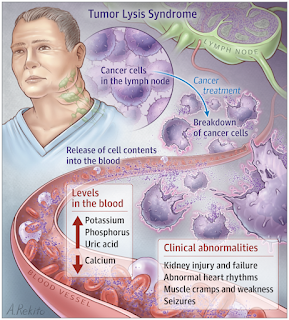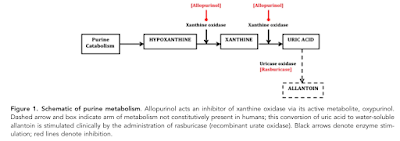Tumour Lysis Syndrome
Introduction
Tumour lysis syndrome is an oncologic emergency that is caused by the massive release of breakdown products from malignant cells; results in hyperkalaemia, hyperuricemia, hyperphosphatemia and hypocalcaemia.
- Renal damage and arrhythymias can follow.
NOTE: Tumor lysis syndrome can be either spontaneous or treatment related.
Cairo and Bishop Classification
Risk Factors
The syndrome is more common
- With some haematological malignancies, e.g. acute leukaemias, non-Hodgkin lymphomas
- With tumours that have a high proliferative rate, large tumour burden or high sensitivity to the antineoplastic.
- With the first cycle of chemotherapy (usually occurs within 12-72 hours after administration, although in some cases, it may occur before chemotherapy).
- In patients with decreased urinary flow, pre-existing hyperuricemia, renal impairment, dehydration or acidic urine.
Prevention
Prevention is important.
- Aggressive hydration (sometimes with diuretics to maintain urine output) promotes urate and phosphate excretion.
- Ensuring adequate hydration alone may be appropriate if risk is low.
- Allopurinol, started before chemotherapy, is given to prevent hyperuricemia in at-risk patients.
- Rasburicase may be used in those unable to take allopurinol or at high risk of tumour lysis syndrome.
- However, rasburicase should generally not be given to individuals with glucose-6-phosphate dehydrogenase (G6PD) deficiency due to the risk of severe haemolysis.
Treatment
Treatment may include rasburicase (for hyperuricemia), hydration, correction of electrolyte abnormalities and management of renal dysfunction.
- Allopurinol should be stopped when rasburicase is commenced.
Electrolyte management
- Hyperkalaemia is an immediate threat and should be treated aggressively.
- Calcium administration should be restricted in symptomatic patients with hypocalcaemia or hyperkalaemia to prevent risk of metastatic calcification in the setting of hyperphosphatemia.
- Hyperphosphatemia should be treated with phosphate binders.
- Patients with persistent electrolyte abnormalities (hyperkalaemia, hyperphosphatemia, and high calcium-phosphate products) and a pronounced decrease in urine output require renal replacement therapy (i.e. dialysis).
NOTE: Urinary alkalinization to promote urate excretion is not recommended because
- There is a lack of clear evidence demonstrating benefit.
- There is a risk of metabolic alkalosis, calcium phosphate precipitation and/or formation of urinary xanthine crystals.
External Links
- Tumor Lysis Syndrome, 2018
- American Society of Nephrology - Online Curricula
- eviQ - Prevention and management of tumour lysis syndrome



Comments
Post a Comment